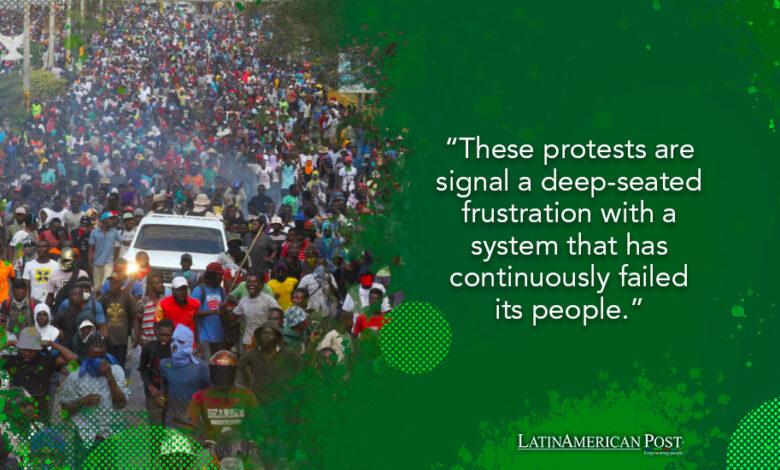Haiti’s Protests are A Desperate Plea Beyond Political Boundaries

The unfolding protests across Haiti, spearheaded by former rebel leader Guy Philippe’s supporters, are far more than a mere political demonstration. They embody a profound and long-standing cry for help from a population that has endured relentless hardship and instability. These protests, which have brought life to a standstill in several Haitian cities, signal a deep-seated frustration with a system that has continuously failed its people.
Desperation in the Streets
The closures of schools, government agencies, and businesses in cities like Jeremie, Miragoane, and Ouanaminthe are not just disruptions; they are symptomatic of a society pushed to the brink. In Les Cayes, where hundreds have taken to the streets, the message is clear: the people of Haiti are desperate for change. The protests have erupted against a backdrop of deepening poverty and escalating gang violence, issues that have been exacerbated by a lack of sustained international attention and support.
Following a nine-year incarceration in the U.S. for a money laundering charge, Guy Philippe’s return to Haiti has reignited a flame of hope for many. Philippe, known for his 2004 rebellion against former President Jean-Bertrand Aristide, represents a transformation figure for some. His message to his supporters, emphasizing a desire not for a coup but for a radical change in Haiti, resonates with a population tired of suffering under the yoke of gangs and a faltering economy.
A System in Shambles
The current state of Haiti, crumbling under the control of dozens of gangs responsible for thousands of deaths and kidnappings, as reported by the United Nations, is a testament to a failed system. The overwhelming power of these gangs and the ineffectiveness of the police force reflect a governance crisis that has left the population vulnerable and exposed to incessant turmoil.
The international community’s response to Haiti’s plight needs to be revised. While humanitarian aid and temporary relief efforts have been provided, long-term, sustainable support must be provided to address the root causes of Haiti’s problems. The focus has often been on short-term political stability and economic aid, neglecting the deeper societal and structural issues that plague the country.
A Wake-Up Call
The protests, therefore, should be seen as a wake-up call. They are a stark reminder of the consequences of international neglect and the urgent need for a comprehensive approach to support Haiti’s path to stability and prosperity. The Haitian people are not just demanding the resignation of Prime Minister Ariel Henry; they are calling for a complete overhaul of a system that has consistently failed them.
These demonstrations should spur the international community into action, not just in the form of immediate relief but through long-term strategies that address the underlying issues of governance, security, and economic development. There is a critical need for engagement beyond mere diplomatic gestures, which involves working closely with local communities and leaders to build a sustainable future for Haiti.
Also read: Ecuador’s Crisis: Beyond the State of Emergency, Militarization, and Plebiscites
The protests in Haiti are a poignant reminder of the ongoing struggles of a nation that has been largely forgotten by the world. They are not just about political grievances but about a people’s fight for survival in a country ravaged by years of instability and neglect.
The international community must heed this cry for help and commit to a long-term partnership with Haiti that prioritizes its people’s welfare and aspirations. Only then can we hope to see a Haiti that rises from the ashes of its tumultuous past to forge a path of stability and prosperity.




